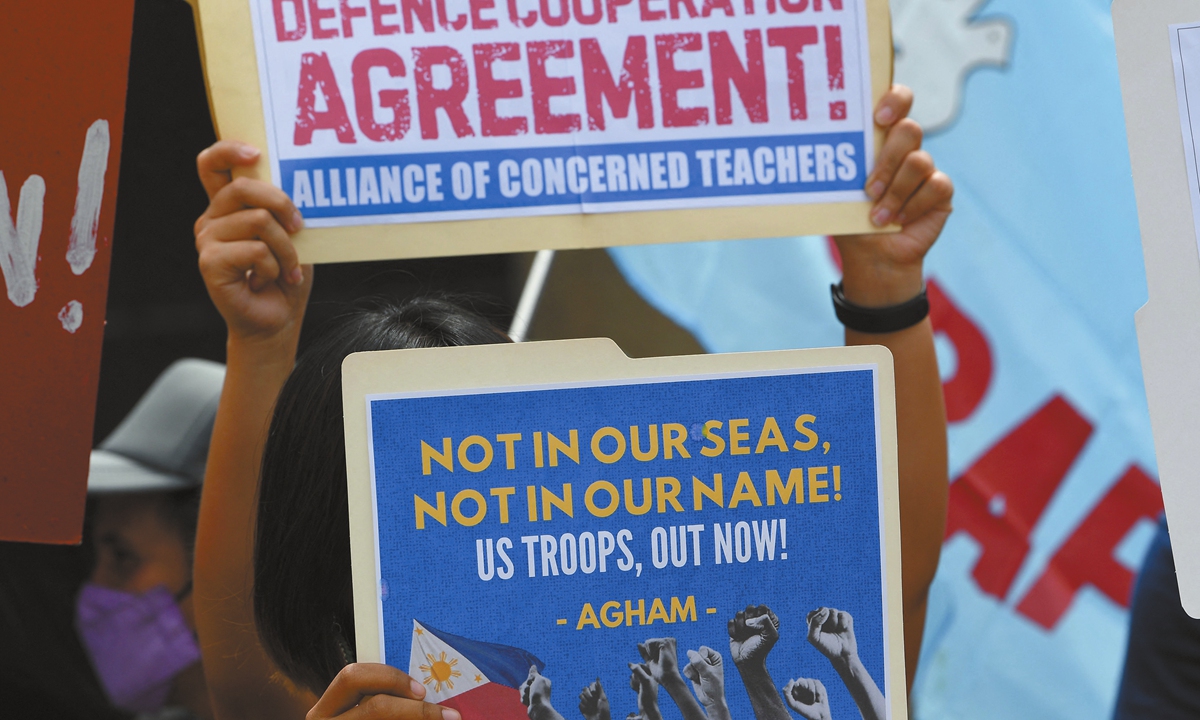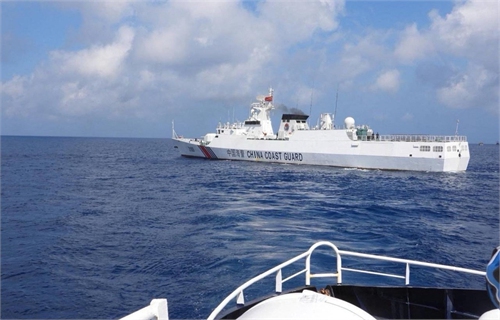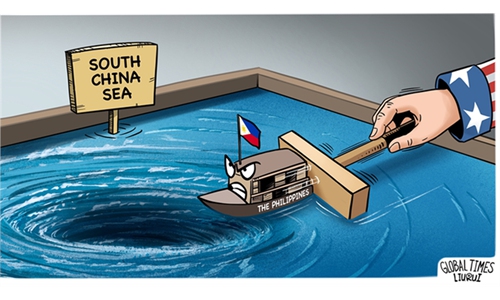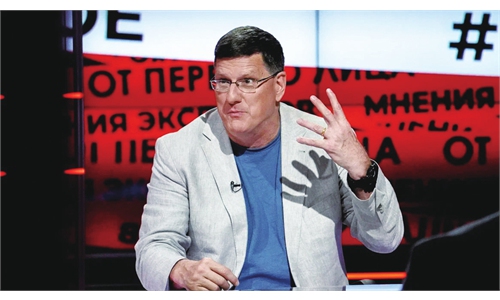
Protesters hold placards during a rally in front of the military headquarters in Manila to protest the opening ceremony of the Philippine-US annual joint military exercise on April 22, 2024. Photo: VCG
Editor's Note:
The escalation of recent tensions between China and the Philippines raises concerns among neighboring countries in the South China Sea. How will the Philippines' provocations, instigated and supported by the US, affect the situation in the South China Sea in the rest of 2024? Why does ASEAN hope that the situation will be contained?
In the "ASEAN Perspective on the South China Sea" series, we collect wisdom and insights from former diplomats and scholars from ASEAN member countries. In an interview with Global Times (GT) reporter Wang Wenwen, University of Philippines Professor Roland Simbulan (Simbulan) criticized the Philippines' Enhanced Defense Cooperation Agreement (EDCA) with the US and argued that the EDCA sites undermine the Philippines' sovereignty and expose the country to potential attacks from America's geopolitical rivals.
The third edition of his book The Bases of Our Insecurity, which was first published in 1983, was launched recently. The book delves into the ramifications of foreign military bases in the Philippines.
GT: Why are you critical of US military bases in the Philippines?
Simbulan: I've always been critical of foreign military presence in our territory. I feel that it is not the right policy to invite a foreign power to deploy bases and troops in one's territory for external defense because they are far from being able to secure your national security. This actually endangers the country's security and its people as the foreign power putting their troops and bases in your territory has enemies, which will soon become your enemies.
For example, in the case of the US, especially now in the new era, what are the current enemies of the US which it could possibly go to war against? In addition to China, there is Russia and also North Korea. And the foreign bases in our territory, in fact, would even endanger our security as we would become some kind of a magnet of attack.
Military-to-military agreements that we have in the Philippines, like the EDCA for example, can only be useful if they are used to strengthen local defense and security forces. We must develop our own capability, maybe with the help of our friends and allies, with whom we have some agreements, either bilateral or multilateral.
But what I'm critical about is the fact that we depend on a foreign power to take care of our external defense. I'm not against having agreements with other countries. What I'd like to see is that these agreements would be able to be used to strengthen our own capability, so that we will have our own modern external defense capability to defend ourselves and not depend on another country, which makes us very vulnerable. It compromises our diplomacy.
Former leaders of Vietnam who led their liberation struggle against the US said that if they only had the capability during the Vietnam War, they would have attacked and struck at the US military bases in the Philippines because they knew that these were being used to bomb their country. The Clark Air Base and Subic Bay Naval Base were actively used as the launching pads and spring boards for American forces to attack Vietnam. It compromised our foreign policy and our relations with Vietnam. We had nothing against the Vietnamese people, but our territory was being used against them. According to these former Vietnamese leaders, they would have hit back if they had the capability then, but at that time they did not.
Now, the situation is different with the enemies of the US which have modern capabilities of striking back if they are attacked.
GT: Several military bases under EDCA are located very close to Taiwan island. The Philippine Ambassador to the US stated in late June that if a conflict breaks out in the Taiwan Straits, Manila may allow the US to use its military bases. How do you evaluate the Philippines' assertive stance on the Taiwan question, and what consequences could it bring to the Philippines?
Simbulan: I don't think the Philippines is in a position to leverage the Taiwan question. But right now, as I see it, it is actually helping the US because, through the EDCA, it has allowed the US to use our territory to set up its bases and install its troops. That already compromises our territory and security. I think even the Philippine government is aware that the US has the intention of using these EDCA bases in the Philippines to interfere should there be a conflict over Taiwan question with China, or should there be a conflict between the US and China in the South China Sea. In fact, we are already allowing our territory to be used as a launching pad and springboard for a foreign country against another country and against a neighbor. This has compromised our national security and even our diplomacy.
I also believe that is what complicates our bilateral ties with China today.
GT: There are some comparisons between the tensions in the South China Sea and the Ukraine crisis, with the fear that the Philippines could become the next Ukraine. What is your view on this? How should the Philippines avoid such a scenario?
Simbulan: As you can see, the policy of the current Philippine government is much different from that of the former administration of president Rodrigo Duterte, who at first was even planning to abrogate some of our military agreements with the US like the Visiting Forces Agreement. There have been high-profile reports about what is happening in the South China Sea, not just in the Western media, but also in the Philippine media.
There is a lot of pressure on the Philippine government to respond to this. And the easiest way is to have this high-profile shift in our policy, which is to invite the US back to the Philippines, through installing military bases and troops, and also engage in regular and frequent joint military exercises.
The Philippine government, in the case of President Ferdinand Marcos Jr., needs the US support as insurance for the internal politics in the Philippines. The US is very influential in the armed forces of the Philippines as it provides weapons and training for our armed forces.
In my book, I made the point that we thought deployment of foreign troops was good for us, but in the long run, it's going to influence and even compromise our internal stability as well as external capability. That's why a few years ago during the time of president Duterte, to help solve our problem in the South China Sea, I was proposing during the talks in ASEAN, that there should be a collective agreement that no ASEAN country could allow foreign troops to be deployed in their territory or no foreign military bases or facilities are to be used or directed against another neighbor because that will compromise the ASEAN countries' interests, and even make them possible targets in the conflict between the two big powers, the US and China.
GT: Do you think the Philippines' high-profile stance in the South China Sea will affect ASEAN as a whole?
Simbulan: Among the 10 member countries of ASEAN, there are disagreements. Many of these ASEAN countries do not want to openly disagree with China because they are trading heavily with China. They receive many tourists from China or their economy is very much dependent on China. However, some other countries don't want to antagonize the US.
Everybody has a stake here in what's happening in the South China Sea. This must be resolved peacefully through negotiations and diplomacy because if something happens here and gets out of control, everybody will be affected. For me, personally, I would prefer that we just have competition through business, trade and markets. It is better to compete that way or negotiate and talk. Sometimes we may say harsh words against each other, but it is important to remember that our disagreements should not escalate to violence. If that happens, it will be too late. Look at what's happening in Ukraine. It's getting out of control, and it's the Ukrainian people and the countries around Ukraine who are suffering as the conflict is affecting their economies, and the livelihood of their people.
There is still a lot of time for dialogue and negotiation. I want to mention to you a model that I wrote recently, a model for ASEAN. I wrote an article recently regarding Vietnam's foreign policy, which I believe should be a good model for ASEAN countries to follow. This is with regards to the foreign policy of Vietnam that they refer to as the "four nos." One, no foreign military agreements with one country against another. Second, no foreign military bases and troops by one power against another. Third, no use of their territory to attack another country. Lastly, no use of force, and instead, diplomacy and negotiation should be employed in the conduct of international relations. We should use that as a model in order to maintain peace and security in our region.
Xiao Bowen contributed to this article



